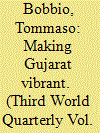|
|
|
Sort Order |
|
|
|
Items / Page
|
|
|
|
|
|
|
| Srl | Item |
| 1 |
ID:
183807


|
|
|
|
|
| Summary/Abstract |
In recent debates in the field of urban studies, issues of informality, marginal settlements, and extreme poverty have often been analysed in relation to the dynamics that transformed spatial and social balances with respect to neo-liberal economic policies. The restructuring of spaces, infrastructure, and economies that marked the success of changing paradigms of urban planning since the 1990s has been widely seen to be responsible for the extensive marginalization of the most vulnerable strata of society. In order to understand the emergence of areas considered informal—or illegitimate—this article aims to question the very validity of categories such as ‘informality’ when applied to analysing the transition from medium-sized urban centres to ‘mega-cities’ (a label that, in itself, blindly recalls the allure of modernization, technology, and development).1 It does so by adopting a longer term perspective in analysing the evolution of a municipal housing project for the resettlement of slumdwellers in Ahmedabad, India, in 1978, which, in the span of four decades, turned into a substandard informal settlement and then into a ‘Muslim city’ called Juhapura. Widely known in India as the ‘biggest ghetto in South Asia’, this area is an observatory for reconsidering the significance of concepts such as informality, illegality, temporariness, and people's legitimacy as citizens.
|
|
|
|
|
|
|
|
|
|
|
|
|
|
|
|
| 2 |
ID:
113097


|
|
|
|
|
| Publication |
2012.
|
| Summary/Abstract |
A significant aspect of India's postcolonial history has been the rise of subnationalism-popularly addressed as the challenge of regionalism-which has often pitted the Indian state against the regional centres of power. In fact, the organisation of Indian territory along linguistic lines favoured the emergence of regional movements challenging the authority of the central government in arguments typical of nationalist rhetoric, such as the specificity of language, territory and traditions. This notion of subnation, however, has taken a new turn during the past two decades of neoliberal reforms as regional states compete with each other to attract greater foreign and domestic investment and to secure higher growth rates. Taking as a point of departure the case of 'Vibrant Gujarat', this article proposes rethinking the emergence of subnational cultures in the past two decades in the light of the effects of the neoliberal economic reforms and the rise of Hindu extremist movements in the political arena.
|
|
|
|
|
|
|
|
|
|
|
|
|
|
|
|
|
|
|
|
|